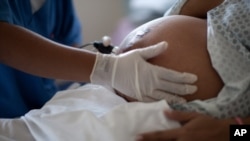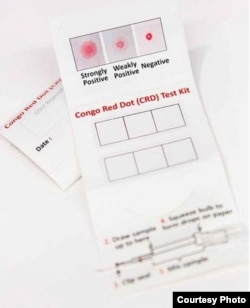Preeclampsia is a mysterious disease, experts say, striking up to 60 percent of pregnant women globally. It is marked by high blood pressure and the presence of protein in the urine.
Untreated, preeclampsia can progress to eclampsia, which can cause seizures and lead to comas. Eclampsia causes 13 percent of maternal deaths around the world.
The only treatment is pre-term delivery, but doing so puts the newborn at high risk of death. Premature birth also increases the chances of learning disabilities and cerebral palsy in the baby.
The condition can only be diagnosed after a physician assesses all the symptoms. Researchers, however, have developed a simple urine test that can tell doctors in three minutes whether a pregnant woman has developed preeclampsia.
How it works
Kara Rood of Ohio State University's Wexner Medical Center in Columbus led the study, in which a drop of the pregnant woman's urine is placed on a piece of paper that contains a red dye called Congo red.
The test detects proteins in the urine that have an abnormal shape in women with preeclampsia, according to Rood.
"When we discovered this, what we were able to do is look at other diseases that have this misfolded protein, such as Alzheimer's [disease],” Rood said. “Then we were able to add Congo red dye that is a dye that pathologists actually use to diagnose Alzheimer's after somebody has died. And we added that to the urine of pregnant women with preeclampsia, and it actually attaches these proteins in the misfolded, abnormal ones."
Effectiveness, benefits
The test was 89 percent effective in detecting the condition in a clinical trial of 343 women at Ohio State who were suspected of having preeclampsia.
Since early delivery is the only treatment for preeclampsia, Rood said knowing the mother's status could save the life of the baby by extending the pregnancy.
"Where preeclampsia is progressive, sometimes you can get a little more time out of the pregnancy if you have the ability to monitor the mom and the baby closely," she said.
Rood presented the findings Feb. 4 at a meeting of the Society for Maternal-Fetal Medicine in Atlanta, Georgia.
The researchers have partnered with a company to develop the test for general use in the hope of getting it to obstetricians in the next few years.





